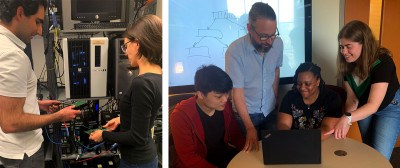UNC—Intel Research Experience for Undergraduate Students
01/03/2023
The University of North Carolina at Chapel Hill, in collaboration with Intel, is offering the Intel Research Experience for Undergraduates (REU) program in the summer of 2023. Students accepted into the program will come to UNC for the summer and conduct research in the areas of hardware and system security under the guidance of UNC faculty and Intel researchers.
We invite rising juniors with an interest in research to apply. No prior research experience is required. Students from all majors are eligible to apply, however we seek students who are majoring in or otherwise have a background in computer science, computer engineering, or electrical engineering.
The program is especially interested in applications from excellent students who share our goal of building an equitable and inclusive learning environment. We especially encourage womxn and students whose racial or ethnic identities have historically been underrepresented in computing to apply.
Dates
Applications will be accepted on a rolling basis until February 15, 2023 or until all positions have been filled, with priority given to those received by December 20, 2022.
Notifications will be made as decisions are made.
The in-person program will run from June 5 through July 28, 2023.
What to Expect
Students will spend eight weeks in Chapel Hill working closely with UNC faculty, graduate students, and Intel researchers. During the day, students will gain experience working on research in systems security, hardware security, and privacy; attend talks by Intel researchers and developers; and meet regularly with their research mentors.
Eligibility
- U.S. citizens or permanent residents
- At least 18 years of age
- Rising juniors
- All majors welcome, with preference to computer science, computer engineering, or electrical engineering majors
Application
The application can be found on the REU’s webpage includes two separate forms:
1. Written responses, a resume/CV and a transcript. The written responses should be between 150 and 300 words. The transcript can be unofficial, though we reserve the right to request an official transcript later.
2. A letter of recommendation. This letter of recommendation should be from a college or university instructor, professor, or academic advisor or from an employer, mentor, or supervisor who knows you and your work, and can comment on your potential for success in a challenging academic environment. This individual should be able to speak to your accomplishments, but also your critical thinking skills, experience collaborating, and ability to learn independently.